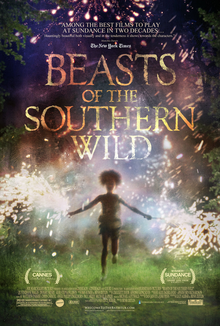“Beasts of
the Southern Wild” is a curious film starring Dwight Henry and 9-year old
Quvenzhané Wallis (the youngest person ever to be nominated for an Academy
Award as best actress). The plot, while generally realist, perhaps even “kitchen
sink realist”, also contains elements of fantasy. Perhaps it could be seen as a
kind of folkish or quasi-folkish Americana? While it´s presumably set in the
present day, it might as well symbolize a future United States around 2050 or
2100.
The main
characters live in “the Bathtub”, a poor and isolated community off the coast
of an anonymous US state (usually believed to be Louisiana since the film was
made there). The community, which is multi-racial and slightly
counter-cultural, clearly resents wider society, symbolized
by a distant city with sky scrapers behind a huge protective wall. It´s not
entirely clear whether the Bathtub people are forcibly segregated or have
chosen to live isolated. Probably the latter, since they
refuse to evacuate the area when ordered to do so by the “proper” authorities.
The seaside
squatters have developed their very own mythology, which claims that an ancient
breed of monstrous beings, the Aurochs, are set to return and wreak havoc on
civilization once the Antarctic icecaps melt due to climate change. Indeed, the
Aurochs (who look like huge boars rather than real aurochs) do return, but it´s
not clear whether they are real, ghostly or simply a figment of the main
character´s vivid imagination. The message of the film is “Green” and
quasi-Buddhist, and Hushpuppy (the name of Wallis´ character) is frequently too
philosophical for her young age.
Otherwise,
the plot is actually quite uninteresting, focusing on Hushpuppy´s troubled
relationship with her parents, an epileptic father and a mother who is a
hooker, but the whole thing never becomes properly tragic. Indeed, “Beasts of
the Southern Wild” is actually quite romantic. 20 years ago, I would probably
have condemned a film like this as “reactionary” since it “romanticizes voluntary
poverty”, stereotypes Blacks, or whatever. I suppose I´m more laidback these
days. That being said, this isn´t my favorite flick, but I´m willing to give it
the OK rating (three stars).

No comments:
Post a Comment